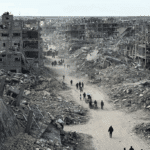Eradicating the ideology of genocide but respecting freedom of speech.
Avocats Sans Frontières is no stranger to Rwanda; present since 1996 the organization initiated, in close collaboration with the European Union and the Belgian Kingdom, a program for the most vulnerable people seeking justice. ASF provides legal aid and a lawyer for those who need to appear before court or the criminal tribunal. They treat a large number of different cases: minors who have been in trouble with the law, violence against women, orphans standing up for their rights relative to the law of succession, aid to survivors of genocide, … To ensure all parties of an unbiased commitment and a fair trial lawyers appointed by ASF make no distinction between who they defend; they are approached to defend either victim or accused. The program already assured hundreds of people accused of crimes related to the ideology of genocide, negationism, sectarianism and discrimination of a worthy defence. In case of a conviction these people look at a sentence of 5 to 25 years imprisonment, a decision with far stretching consequences for all parties involved.
In 2001, 2003 and 2008 Rwanda promulgated 3 laws in an effort to ban and prosecute acts of sectarianism, genocide and the ideology of genocide. A positive signal but soon questions were raised about the definition and the prosecution of these infringements and the process related to the furnishing of proof (primarily based on testimonies and confessions). But that's not all; these three new laws also fuelled a twofold discussion about the fine line between the basic right of freedom of speech and repression and about incursions of human dignity based on ethnic discrimination or someone's age, sex or social status.
Within the context of these critics ASF requested Miss. Caroline Sculier to investigate the judicial practice in cases related to the ideology of genocide and its ensuing infractions. The study presents a general picture of the Rwandan jurisprudence and the judicial practice in these matters. The results are based upon a thorough analysis of about thirty rulings in cases treated by ASF in the context of its program for the most vulnerable persons seeking justice. The paper La pratique judiciaire du contentieux de l'idéologie du génocide et infractions connexes (Judicial practice related to litigations on matters of the ideology of genocide and related infractions) formulates different objectives:
- develop and extend the knowledge of the judicial practice used within the context of the three new laws,
- trying to identify and understand the difficulties and challenges the judicial system and its actors face in interpreting and implementing the new laws,
- contribute to the reflection about the limits of the legal texts and about aligning these texts with the general legal principles,
- formulate recommendations on the reform of the law on the ideology of genocide.
The study is presented in Kigali on March 30th last. The workshop brought together the key figures in the legal battle against genocide and the ideology of suicide; donors, officials of the judicial system (public prosecutors, judges, police officers, representatives of the national commission for human rights) and organizations representing the civil society. The timing of the workshop was crucial: the Rwandan government is taking a close look at the law on the ideology of genocide and considers altering it to get it in line with the international standards. Taken the expertise of ASF, the organization takes up its place at the front line to contribute to these reforms.
The introduction of the study and its results were preceded by an important message of the European Union: a representative of the EU stressed the importance of the study and is convinced its results entail useful information for all parties involved in the process of reinforcing the constitutional state. Following the presentation of the study ASF was offered the opportunity to present its own program for those people who are accused of crimes related to genocide, the ideology of genocide and sectarianism and are seeking justice (lessons learned and challenges). A debate amongst the participants on the recommendations and follow-up of the study with the institutions involved proved to be an interesting closure of the day.
A complete and unabridged edition of the study can be downloaded here (pdf in French).





